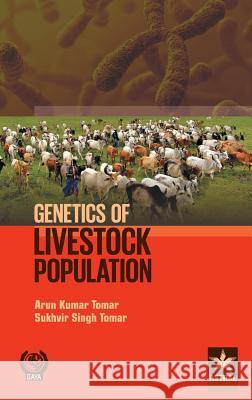Genetics of Livestock Population » książka
Genetics of Livestock Population
ISBN-13: 9789351306634 / Angielski / Twarda / 2015 / 582 str.
The book entitled 'Genetics of Livestock Population' has been divided in 3 parts comprising 27 chapters. The first part of 13 chapters has been devoted to the genetic structure of population in equilibrium state for different genetic systems and the changes occurred under the influence of evolutionary forces, population size and mating systems for qualitative characters. The second part comprises 10 chapters covering the partitioning of phenotypic value, variance and covariance of quantitative characters in to different components attributed to additive and non-additive genetic effects. The last part of 4 chapters of the book deal with the biometrical techniques viz. univariate, bivariate and multivariate analysis and path analysis. Hope this book will be of immense use to the post graduate students, teachers and those appearing in different All India Competitive Examinations like NET, SRF, and ARS conducted by ASRB (ICAR) as well as by UGC and UPSC. The subject matter has been presented in single volume in a more meaningful and desired manner and simple language with numerical examples.
The book entitled Genetics of Livestock Population has been divided in 3 parts comprising 27 chapters. The first part of 13 chapters has been devoted to the genetic structure of population in equilibrium state for different genetic systems and the changes occurred under the influence of evolutionary forces, population size and mating systems for qualitative characters. The second part comprises 10 chapters covering the partitioning of phenotypic value, variance and covariance of quantitative characters in to different components attributed to additive and non-additive genetic effects. The last part of 4 chapters of the book deal with the biometrical techniques viz. univariate, bivariate and multivariate analysis and path analysis. Hope this book will be of immense use to the post graduate students, teachers and those appearing in different All India Competitive Examinations like NET, SRF, and ARS conducted by ASRB (ICAR) as well as by UGC and UPSC. The subject matter has been presented in single volume in a more meaningful and desired manner and simple language with numerical examples.











